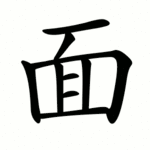Radical 176
Radical 176 or radical face (面部) meaning "face" is one of the 11 Kangxi radicals (214 radicals in total) composed of 9 strokes.
| 面 | ||
|---|---|---|
| ||
| 面 (U+9762) "face" | ||
| Pronunciations | ||
| Pinyin: | miàn | |
| Bopomofo: | ㄇㄧㄢˋ | |
| Wade–Giles: | mien4 | |
| Cantonese Yale: | min6 | |
| Jyutping: | min6 | |
| Japanese Kana: | メン men / ベン ben (on'yomi) おも omo / おもて omote (kun'yomi) | |
| Sino-Korean: | 면 myeon | |
| Hán-Việt: | diện, miến | |
| Names | ||
| Japanese name(s): | 面/めん men | |
| Hangul: | 낯 nat[1] | |
| Stroke order animation | ||
 | ||
In the Kangxi Dictionary, there are 66 characters (out of 49,030) to be found under this radical.
面 is also the 180th indexing component in the Table of Indexing Chinese Character Components predominantly adopted by Simplified Chinese dictionaries published in mainland China.
In Simplified Chinese, 面 is also used as the simplified form of 麵/麪 ("noodles" or "flour").
Evolution
 Oracle bone script character
Oracle bone script character Small seal script character
Small seal script character
Sinogram
The radical is also used as an independent Chinese character. It is one of the Kyōiku kanji or Kanji taught in elementary school in Japan.[2] It is a third grade kanji[2]
References
- Oh Hyung Min. "Hanja History Trek - Chinese radical entries site". Retrieved 2011-04-07.
- "The Kyoiku Kanji (教育漢字) - Kanshudo". www.kanshudo.com. Archived from the original on March 24, 2022. Retrieved 2023-05-06.
Literature
- Fazzioli, Edoardo (1987). Chinese calligraphy : from pictograph to ideogram : the history of 214 essential Chinese/Japanese characters. calligraphy by Rebecca Hon Ko. New York: Abbeville Press. ISBN 0-89659-774-1.
- Lunde, Ken (Jan 5, 2009). "Appendix J: Japanese Character Sets" (PDF). CJKV Information Processing: Chinese, Japanese, Korean & Vietnamese Computing (Second ed.). Sebastopol, Calif.: O'Reilly Media. ISBN 978-0-596-51447-1.
This article is issued from Wikipedia. The text is licensed under Creative Commons - Attribution - Sharealike. Additional terms may apply for the media files.